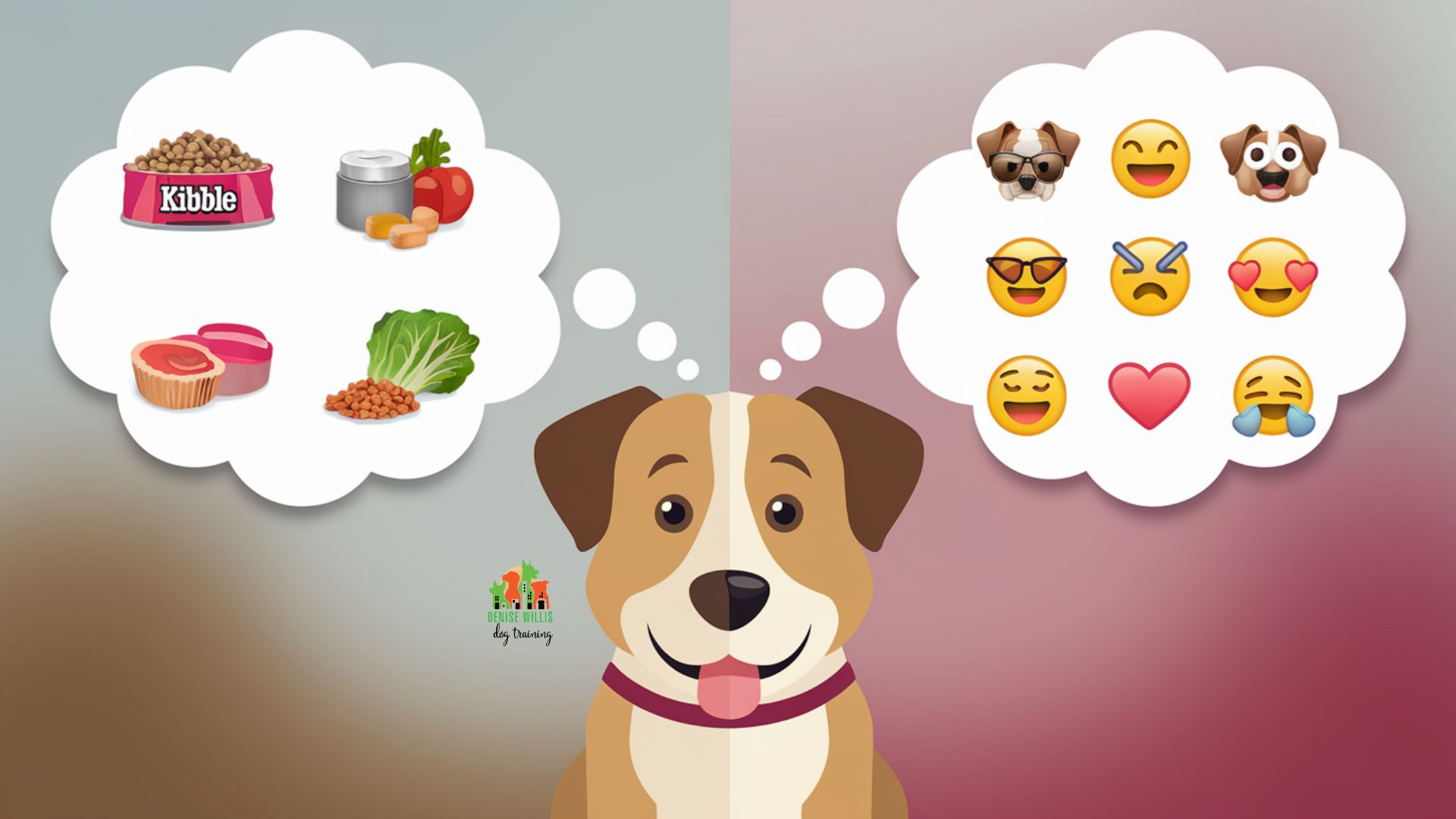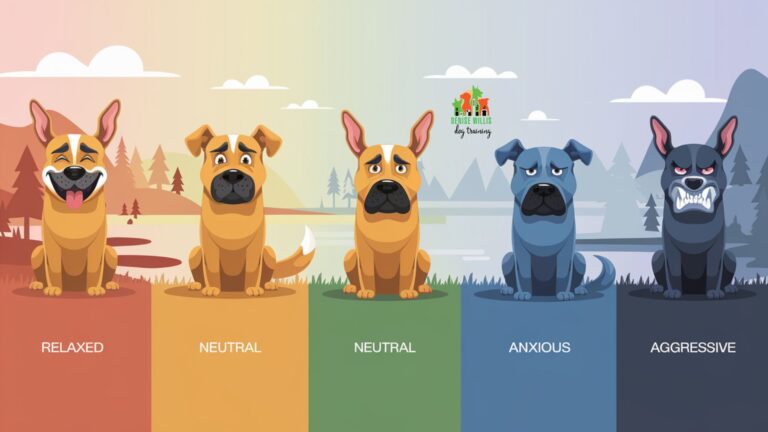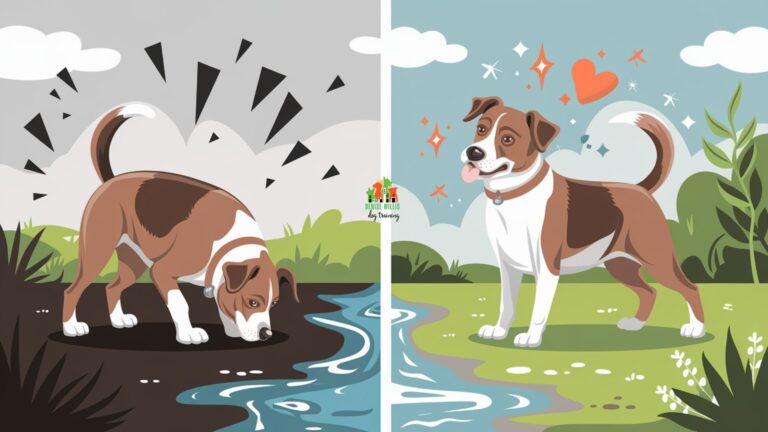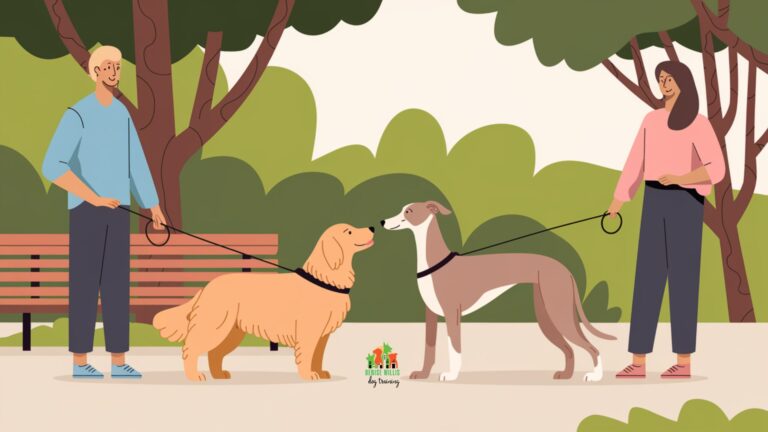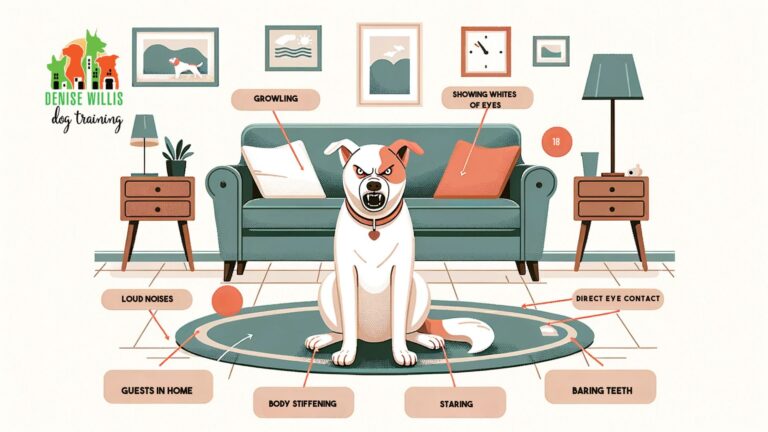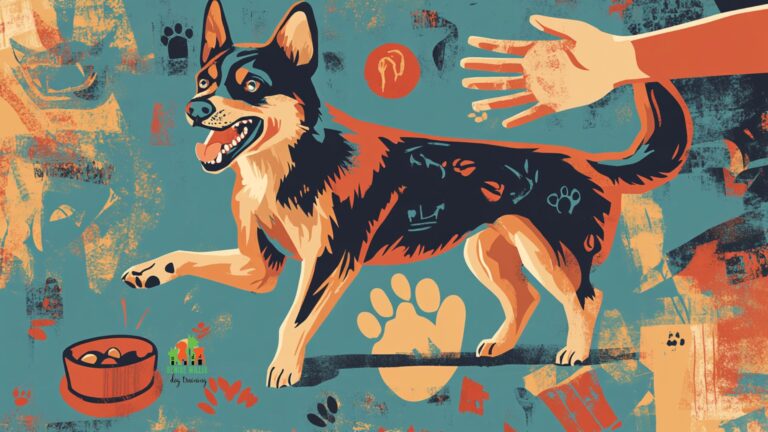Food for Thought: The Surprising Link Between Nutrition and Dog Aggression
📍 Service Area Notice: DW Dog Training provides in-person training services exclusively in the Greater Baltimore area. While our blog content is designed to help dog owners internationally, our hands-on training services are locally focused. For readers outside our service area, we hope you find value in our articles and welcome you to reach out with questions!
Ever noticed how your normally sweet pup turns into a tiny terror after certain meals?
You’re not imagining things. The connection between what goes into your dog’s bowl and their behavior runs deeper than you might think.
Key Takeaways
- Protein isn’t just about muscles – high levels can actually increase aggressive tendencies
- Balanced meals affect more than the waistline – they influence brain chemistry
- Gut health plays a starring role in behavior modification
- Strategic dietary changes can support training efforts
- Professional guidance ensures safe nutritional transitions
The Big Picture: Diet and Dog Behavior
Think of your dog’s diet as their personal mood regulation system – kind of like how humans get “hangry” when they skip lunch, except our four-legged friends can’t order takeout when they’re feeling off.
Here’s a visual breakdown of how what goes into the food bowl affects what goes on in their head.
Diet’s Impact on Dog Behavior
Protein Impact
High-protein diets (>30%) can increase aggression by 1.4x. Lower protein levels may help calm reactive dogs within a week.
Carb Balance
Keep carbohydrates under 35% of diet to prevent blood sugar spikes that can trigger reactive behavior.
Tryptophan Effect
Increased tryptophan levels help boost serotonin production, naturally reducing territorial aggression.
Gut-Brain Link
A healthy gut microbiome supports balanced behavior. Probiotics and fresh foods can improve mood and reduce reactivity.
Now you can see why that protein-packed diet might be turning your sweet pup into a tiny torpedo, or why those blood sugar crashes could be behind those backyard boxing matches. Keep these connections in mind as we dig deeper into each factor’s role in your dog’s behavior.
When Food Fuels the Fire
Remember that old saying “you are what you eat”?
Turns out it applies to our four-legged friends too. According to research from Cambridge University, what your dog eats directly impacts their mood, behavior, and response to training.
Protein’s Hidden Impact
Think protein is always your pup’s best friend?
Not so fast. While protein is essential for health, too much might turn your sweetheart into a spitfire. Recent studies involving Golden Retrievers found that dogs on high-protein diets were significantly more likely to show aggressive behaviors toward both their owners and other dogs.
The magic number?
Less than 18% protein in the diet could lead to noticeable behavioral improvements within just a week, as noted by K-9 Culture’s behavioral research.
The Serotonin Connection
Who knew happiness could come from an amino acid?
Tryptophan, the same stuff that makes you sleepy after Thanksgiving turkey, plays a crucial role in your dog’s mood. Furry Friends Network reports that increasing tryptophan relative to other amino acids can significantly reduce territorial aggression.
Think of tryptophan as your dog’s natural chill pill. It helps produce serotonin, the feel-good brain chemical that keeps aggression in check.
Blood Sugar Rollercoaster
Just like humans get “hangry,” dogs can experience mood swings from blood sugar fluctuations. According to Oma’s Pride nutritional research, high-carbohydrate diets might turn your pup into an emotional rollercoaster rider.
Your Dog’s Dietary Journey
Just like humans don’t go from baby food to five-star cuisine overnight, your dog’s nutritional needs evolve with time.
And guess what? Their behavior changes right along with it! Here’s your roadmap to understanding how diet and behavior dance together throughout your pup’s life.
Your Dog’s Diet-Behavior Journey
Puppy Stage (8-12 weeks)
Your tiny food vacuum needs 4 meals daily to keep their energy steady. Think of them as a toddler with a turbo engine – frequent refueling prevents those hangry meltdowns! Split their daily food into 4 portions at 8 AM, noon, 4 PM, and 8 PM.
Growing Pup (3-6 months)
Time to transition to 3 meals daily (8 AM, 2 PM, 8 PM). Watch protein levels – too much can turn your sweet pup into a tiny tornado! This is prime time to establish good eating habits and prevent food-related aggression.
Teenage Phase (6-12 months)
Welcome to the “testing boundaries” stage! Two meals daily now (8 AM, 8 PM). This is when that protein-behavior link becomes crucial – keep it under 30% to help manage those teenage mood swings. Start transitioning to adult food gradually.
Adult Years (1-7 years)
The sweet spot of two balanced meals daily, 12 hours apart. If your dog shows signs of aggression, consider lowering protein to 18% and watch for improvement within a week. Remember: a balanced gut means a balanced mind!
Golden Years (7+ years)
Senior dogs often need diet adjustments to maintain their sunny disposition. Keep the two-meal schedule but consider senior-specific food with moderate protein levels. Pain can trigger aggression, so watch for signs of discomfort affecting eating habits.
Each stage brings its own challenges and opportunities. Click on any stage to learn more about how to keep your furry friend’s diet and behavior in perfect harmony.
Calming Through Nutrition
Ever noticed how some people get jittery after too much coffee?
Dogs experience similar reactions to their food. Creating the right nutritional balance isn’t just about maintaining a healthy weight. It’s about crafting a recipe for balanced behavior.
Finding the Right Balance
Let’s talk kitchen chemistry for canines. The Holistic Dog Training Organization suggests that balance is everything. Too much protein turns up the intensity dial, while the right mix of nutrients helps your dog maintain their cool.
Quick tip: Think of your dog’s diet like a symphony.
Every ingredient plays its part, but none should overwhelm the others. According to Pet Honesty’s behavioral research, carbohydrates shouldn’t exceed 35% of your dog’s diet. Any more, and you might as well be giving them tiny cups of espresso.
Smart Supplementation Strategies
Sometimes your pup needs a little extra help staying zen. Research published by Tufts University shows that strategic supplementation can make a real difference.
Consider these mood-boosting additions:
- Omega-3 fatty acids for brain health
- Probiotics for gut balance
- B-vitamins for stress management
- Natural sources of tryptophan
Feeding Schedule Fundamentals
Timing isn’t just everything in comedy. It’s crucial in canine nutrition too. Nature’s Menu behavioral experts emphasize that consistent feeding schedules help regulate both digestion and behavior.
Think of it like this.
Nobody likes a hangry human, and nobody wants a hangry hound either. Regular, properly spaced meals keep blood sugar stable and tempers in check.
The Gut-Brain Connection
Remember thinking your gut feelings were just superstition?
Science now shows that your dog’s gut might be their second brain. The connection between digestive health and behavior is stronger than we ever imagined.
Microbiome Mysteries
According to Big Dog Pet Foods’ research, the tiny organisms living in your dog’s digestive system influence everything from mood to memory. It’s like having millions of tiny mood managers working around the clock.
Recent studies have found specific bacterial strains linked to aggressive tendencies.
The good news? You can help promote better bacterial balance through diet.
Probiotic Power
Want to give your dog’s gut garden a boost?
Oma’s Pride nutritional experts recommend incorporating probiotic-rich foods like:
- Plain yogurt (no artificial sweeteners!)
- Kefir
- Fermented vegetables
- Specialized canine probiotic supplements
Just remember to start small.
Nobody wants to deal with the fallout of too much-fermented goodness at once.
Food Sensitivities
Just like humans, dogs can have food sensitivities that affect their mood. The Dog Food Advisor reports that identifying and eliminating problem ingredients can transform behavior.
Common culprits include:
- Artificial preservatives
- Certain protein sources
- Wheat or corn gluten
- Artificial colors and flavors
The Numbers Behind Nutrition and Aggression
Remember when your mom said “you are what you eat” and you rolled your eyes? Well, turns out she was onto something – at least when it comes to our four-legged friends. Let’s dive into some eye-opening statistics that might make you look at your dog’s dinner bowl differently.
Think of these numbers like your dog’s report card for their dietary behavior – except instead of grades in math and science, we’re looking at how different nutrients affect their inner zen master (or lack thereof).
| Dietary Factor | Impact | Notes | Source |
|---|---|---|---|
| High Protein Diet (>30%) | 1.4x increase | Higher likelihood of owner-directed aggression | [SSRN Research, 2024] |
| Low Protein Diet (<18%) | 7 days | Time to observe behavioral improvements | [K-9 Culture] |
| High Carbohydrate Diet | 35% threshold | Maximum recommended carb content before behavior impact | [Pet Honesty] |
| Tryptophan Supplementation | Significant decrease | Reduction in territorial aggression when balanced with other amino acids | [Furry Friends Network] |
| Dog Rivalry | 1.3x increase | Higher likelihood with high-protein diets | [SSRN Research, 2024] |
Pretty sobering numbers, right? But don’t panic if you’ve been feeding your dog a protein-packed diet fit for a bodybuilder – remember, every dog is unique, kind of like how some humans can drink coffee at midnight and still sleep like a baby, while others get the jitters from sniffing a coffee bean. The key is finding your pup’s sweet spot between nutrition and zen.
Now that we’ve crunched the numbers (and hopefully not stress-eaten all the dog treats), let’s talk about how to make those dietary changes without turning your kitchen into a doggy drama zone…
Making Dietary Changes
Ready to revamp your dog’s diet?
Hold those horses or should we say, hold those hounds. Sudden dietary changes can backfire faster than a tennis ball launcher with fresh batteries.
Transition Techniques
The key to successful dietary changes lies in patience and observation. Cambridge University researchers recommend a gradual transition over 7-10 days:
- Days 1-3: 75% old food, 25% new food
- Days 4-6: 50/50 mix
- Days 7-9: 25% old food, 75% new food
- Day 10: Full transition to new diet
Monitoring Progress
Keep a “mood food diary” tracking your dog’s behavior changes. Note things like:
- Energy levels throughout the day
- Reactions to typical triggers
- Sleep patterns
- Digestive health
- Training responsiveness
This information proves invaluable when fine-tuning their diet.
Working with Professionals
Nobody expects you to become a canine nutritionist overnight. That’s like asking your dog to file their own tax returns. It’s echnically possible, but probably not the best approach.
Remember, changing your dog’s diet is like adjusting the ingredients in a gourmet recipe. It takes knowledge, precision, and sometimes a bit of expert guidance. Always consult with your veterinarian before making significant dietary changes, especially when addressing aggression issues.
Product Recommendations
Think your dog’s mood swings are wilder than a squirrel after drinking espresso? Time to stock up on some mood-boosting goodies! Here’s our handpicked selection of products that might just turn your furry friend from Oscar the Grouch to Mr. Rogers.
- Wellness Natural Pet Food CORE Digestive Health: Your dog’s gut bugs need pampering too! This probiotic-packed kibble comes with digestive enzymes and prebiotic fibers. Warning: May cause your dog to develop a sophisticated palate and start judging your cooking skills.
- Purina Pro Plan Veterinary Supplements Calming Care: These probiotic supplements are like tiny zen masters for your dog’s tummy. Contains the famous BL999 strain that helps reduce anxiety-related behaviors. Caution: Your dog might start meditating and asking for a yoga mat.
- Blue Buffalo Basics Limited Ingredient Diet: Perfect for finding out if your dog’s attitude problem is actually a food sensitivity in disguise. Single protein source and easy-to-digest ingredients make this a tummy-friendly choice. Warning: May lead to your dog becoming a food critic and writing Yelp reviews.
- Nature’s Logic Sardine Feast: Omega-3s for the win! This fish oil supplement supports brain health and reduces inflammation. Plus, it makes your dog’s coat shinier than a disco ball. Caution: Your dog might start attracting compliments and developing a diva personality.
- Pet Naturals of Vermont Calming Treats: L-Theanine and other natural ingredients help take the edge off without turning your guard dog into a couch potato. Warning: Side effects may include random acts of chill and excessive snuggling.
Remember folks, while these products won’t instantly transform your dog into a zen master, they’re excellent supporting actors in the blockbuster movie that is behavior modification!
Further Reading
Ready to become a certified dog behavior detective?
These articles will take you from “What just happened?” to “Ah, that explains everything!” Just don’t let all this knowledge go to your head – your dog might get jealous of your new expertise.
- Dog Aggression Solutions: A Complete Guide to Stopping Aggressive Behavior in Dogs: Your ultimate playbook for understanding why your sweet potato sometimes turns into a spicy pepper. Packed with practical solutions that don’t require a PhD in dog psychology.
- Decoding Your Dog: 15 Body Language Signals You Need to Know: Because your dog’s been trying to tell you something, and no, they’re not just practicing their interpretive dance moves.
- How to Manage Your Dog’s Territorial Aggression: For when your dog thinks they’re the self-appointed mayor of your front yard. Learn how to negotiate better property agreements with your four-legged real estate agent.
- 5 Proven Strategies to Stop Your Dog’s Aggression Towards Other Dogs: Transform your canine confrontationalist into a social butterfly. Because the dog park shouldn’t feel like an episode of Game of Thrones.
- 10 Warning Signs Your Dog Might Bite and How to Prevent It: Because sometimes “I’m fine” means the same thing for dogs as it does for humans – absolutely nothing’s fine! Learn to read between the growls.
Remember, knowledge is power, but knowledge with treats is even better! Keep these articles bookmarked and your treat pouch full – you’re now equipped to become your dog’s favorite behavior coach.
Frequently Asked Questions About Nutrition and Dog Aggression
Q: Can switching to a raw diet help with aggression?
A: While some dogs thrive on raw diets, Nature’s Menu research suggests it’s the nutrient balance that matters most, not whether the food is raw or cooked. The key is finding the right protein levels and ensuring balanced nutrition.
Q: How quickly will I see changes after adjusting my dog’s diet?
A: According to K-9 Culture, some dogs show improvement within a week of dietary changes. However, every dog is unique – think of it like human diets: some people respond quickly to dietary changes, while others need more time.
Q: Will supplements alone fix aggressive behavior?
A: Not quite! Think of supplements like backup singers – they support the main performance (training and proper nutrition) but shouldn’t be expected to carry the whole show. Pet Honesty experts emphasize that supplements work best as part of a comprehensive behavior modification plan.
Q: Is grain-free better for aggressive dogs?
A: Plot twist – not necessarily! The Dog Food Advisor notes that unless your dog has specific grain sensitivities, quality grains can provide steady energy and help maintain stable blood sugar levels, potentially supporting better behavior.
Test Your Doggy Diet Smarts!
Think you’ve got a handle on how your pup’s dinner affects their demeanor? Time to put your knowledge to the test! Don’t worry if you don’t ace it – learning about canine nutrition is a journey, not a sprint. Besides, your dog probably doesn’t remember what they had for breakfast either!
Test Your Knowledge: Diet’s Impact on Dog Behavior
From Food Bowl to Better Behavior
Your dog's food bowl might just be the secret weapon in your behavior modification arsenal. By understanding the science behind nutrition's impact on behavior and making thoughtful dietary choices, you're setting your furry friend up for success.
At DW Dog Training, we've seen countless dogs transform through the power of proper nutrition combined with professional training. Sometimes, the path to better behavior starts with what's in the bowl, not just what's in the training manual.
Share Your Experience
Have you noticed changes in your dog's behavior after adjusting their diet?
Your experience could help other pet parents on their journey. Remember, every dog is unique, and sharing our stories helps build a stronger, more knowledgeable pet parent community.
Looking for personalized guidance on your dog's nutritional needs and behavior modification?
DW Dog Training offers comprehensive evaluations that consider both diet and behavior. Together, we can create a tailored plan that helps your dog become their best, most balanced self.
After all, a well-fed dog is often a well-behaved dog. And, that's something worth wagging about!

